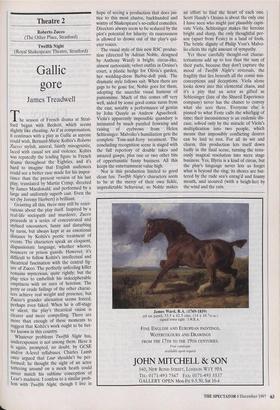Theatre 2
Roberto Zucco (The Other Place, Stratford) Twelfth Night (Royal Shakespeare Theatre, Stratford)
Gallic gore
James Treadwell
The season of French drama at Strat- ford began with Beckett, which seems slightly like cheating. As if in compensation, it continues with a play as Gallic as anyone could wish, Bernard-Marie Koltes's Roberto Zucco: stylish, amoral, faintly misogynistic, laced with casual sex and violence. Koltes was reputedly the leading figure in French drama throughout the Eighties, and it's hard to imagine that English audiences could see a better case made for his impor- tance than the present version of his last play, translated by Martin Crimp, directed by James Macdonald, and performed by a large and uniformly superb cast. Even the set (by Jeremy Herbert) is brilliant.
Granting all this, there may still be reser- vations about the play itself. Inspired by a real-life sociopath and murderer, Zucco proceeds in a series of concentrated and stylised encounters, funny and disturbing by turns, but always kept at an emotional distance by Koltes's poetic treatment of events. The characters speak an eloquent, dispassionate language, whether whores, bouncers or prison guards. However, it's difficult to follow Koltes's intellectual and theatrical fascination with the central fig- ure of Zucco. The perfectly unfeeling killer remains mysterious, quite rightly; but the Play tries to embellish his indecipherable emptiness with an aura of heroism. The petty or crude failings of the other charac- ters achieve real weight and presence, but Zucco's grander alienation seems forced, perhaps even faked. When he is off-stage or silent, the play's theatrical vision is clearer and more compelling. There are more than enough of these moments to suggest that Koltes's work ought to be bet- ter known in this country.
Whatever problems Twelfth Night has, underexposure is not among them. Here it is again, prompted, no doubt, by GCSE and/or A-level syllabuses. Charles Lamb once argued that Lear shouldn't be per- formed; he thought the sight of an actor tottering around on a mock heath could never match his sublime conception of Lear's madness. I confess to a similar prob- lem with Twelfth Night, though I live in
hope of seeing a production that does jus- tice to this most elusive, backhanded and wintry of Shakespeare's so-called comedies. Directors always seem to be seduced by the plot's potential for hilarity; its raucousness is allowed to drown out of the play's qui- eter voices.
The visual style of this new RSC produc- tion (directed by Adrian Noble, designed by Anthony Ward) is bright, circus-like, almost cartoonish; velvet outfits in Orsino's court, a plastic hedge for Olivia's garden, her wedding-dress Barbie-doll pink. The dramatic style follows suit. When there are gags to he gone for, Noble goes for them, adopting the anarchic visual humour of pantomime. Much of this comes off very well, aided by some good comic turns from the cast, notably a performance of genius by John Quayle as Andrew Aguecheek. Viola's apparently impossible quandary is intimated by much puzzled frowning and raising of eyebrows from Helen Schlesinger. Malvolio's humiliation gets the complete Tom-and-Jerry treatment. The concluding recognition scene is staged with the full repertory of double takes and amazed gawps, plus one or two other bits of opportunistic funny business. All this keeps the entertainment value high.
Nor is this production limited to good clean fun. Twelfth Night's characters seem to be at the mercy of their own fickle, unpredictable behaviour, so Noble makes an effort to find the heart of each one. Scott Handy's Orsino is about the only one I have seen who might just plausibly capti- vate Viola. Schlesinger makes the heroine bright and sharp, the only thoughtful per- son (apart from Feste) in a land of fools. The brittle dignity of Philip Voss's Malvo- lio elicits the right amount of sympathy.
Yet these carefully thought-out charac- terisations add up to less than the sum of their parts, because they don't capture the mood of Twelfth Night's reversals, the fragility that lies beneath all the comic mis- conceptions and deceptions. Viola alone looks down into this elemental chaos, and it's a pity that an actor as gifted as Schlesinger (late of the Shared Experience company) never has the chance to convey what she sees there. Everyone else is pinned to what Feste calls the whirligig of time; their inconsistency is an endemic dis- ease, solved only by the miracle of Viola's multiplication into two people, which means that impossibly conflicting desires can be laid to rest. For all its wit and charm, this production lets itself down badly in the final scene, turning the tenu- ously magical resolution into mere stage business. Yes, Illyria is a kind of circus, but the play's language never lets us forget what is beyond the ring; its shores are bat- tered by the rude sea's enrag'd and foamy mouth, and scoured (with a heigh-ho) by the wind and the rain.


















































































 Previous page
Previous page